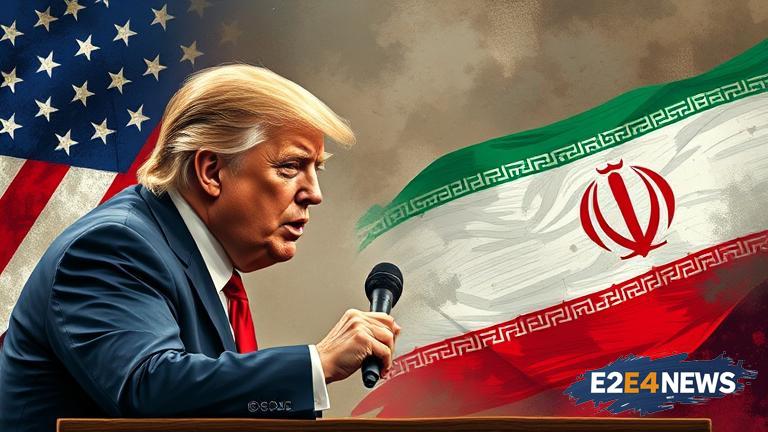The United States and Iran have been at odds for months, with tensions escalating over issues such as nuclear proliferation, oil exports, and regional influence. Recently, US President Donald Trump stated that he is in no hurry to engage in diplomatic talks with Iranian leaders. This stance has been met with skepticism by some, who argue that dialogue is essential to resolving the ongoing crisis. Trump’s comments come amidst a backdrop of heightened tensions, including the imposition of stringent economic sanctions on Iran by the US. These sanctions have had a devastating impact on the Iranian economy, leading to widespread protests and unrest. Despite this, Trump remains resolute in his approach, insisting that Iran must first agree to abandon its nuclear ambitions and cease supporting militant groups in the region. Iranian leaders, however, have thus far refused to back down, maintaining that their nuclear program is for peaceful purposes and that they will not be intimidated by US aggression. The situation has been further complicated by the involvement of other regional players, including Saudi Arabia and the United Arab Emirates, who have been vocal in their support for the US stance. As the standoff continues, there are growing concerns about the potential for miscalculation or accidental conflict. The US has deployed additional military assets to the region, including an aircraft carrier strike group, in a bid to deter Iranian aggression. Meanwhile, Iran has responded by announcing plans to breach certain limits on its nuclear activities, a move that has been condemned by the international community. The European Union, in particular, has been working to salvage the 2015 nuclear deal, which Trump withdrew from last year. However, their efforts have been hindered by the US sanctions, which have made it difficult for European companies to do business with Iran. As the crisis deepens, there are fears that it could have far-reaching consequences for global energy markets and regional stability. The US and Iran have been at odds for decades, and the current tensions are merely the latest manifestation of a long-standing rivalry. Despite this, there are still hopes that a diplomatic solution can be found, one that addresses the concerns of both sides and avoids the need for military action. For now, though, the situation remains precarious, with both sides dug in and refusing to back down. The international community will be watching developments closely, eager to see if a way can be found to resolve the crisis peacefully. The US-Iran dispute has significant implications for global security and the future of the Middle East, and a resolution will require careful diplomacy and a willingness to compromise. As the world waits with bated breath, one thing is clear: the US-Iran tensions are a major geopolitical flashpoint, and their resolution will have far-reaching consequences for years to come.
Tue. Oct 21st, 2025
